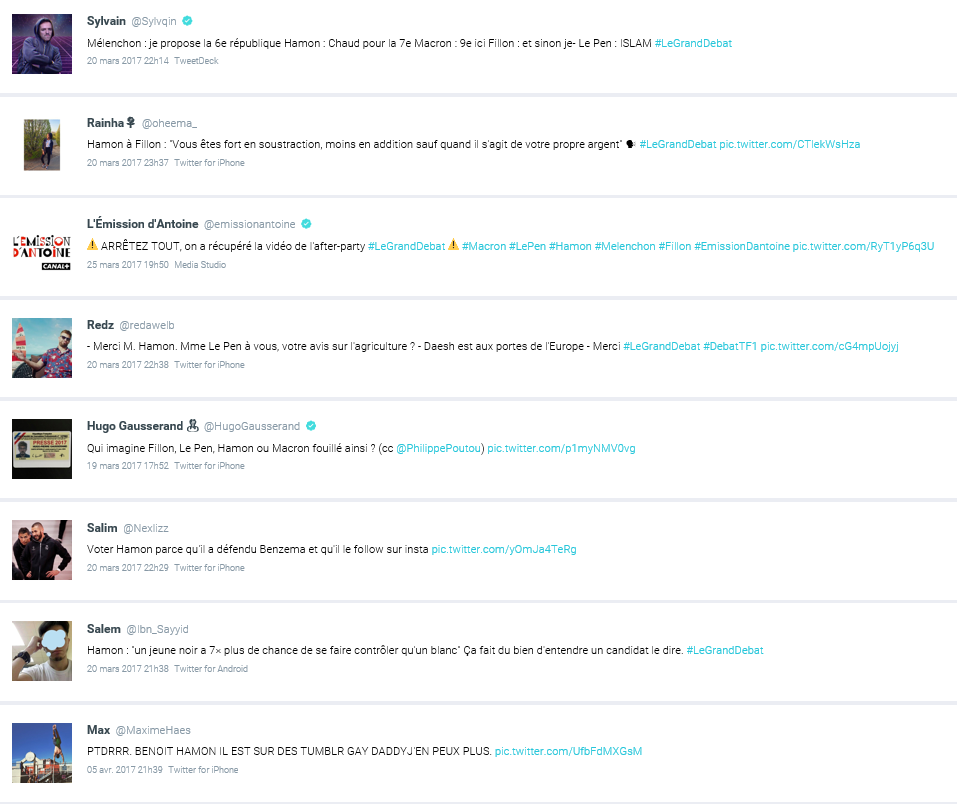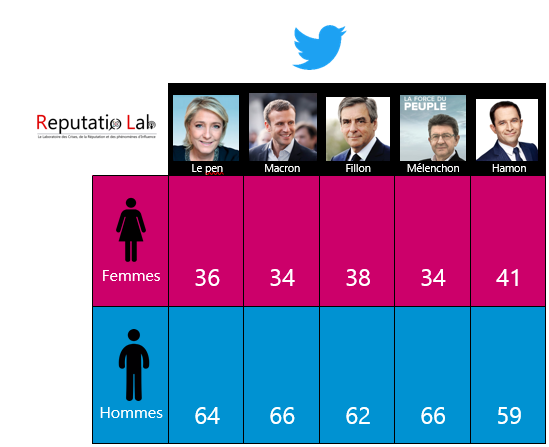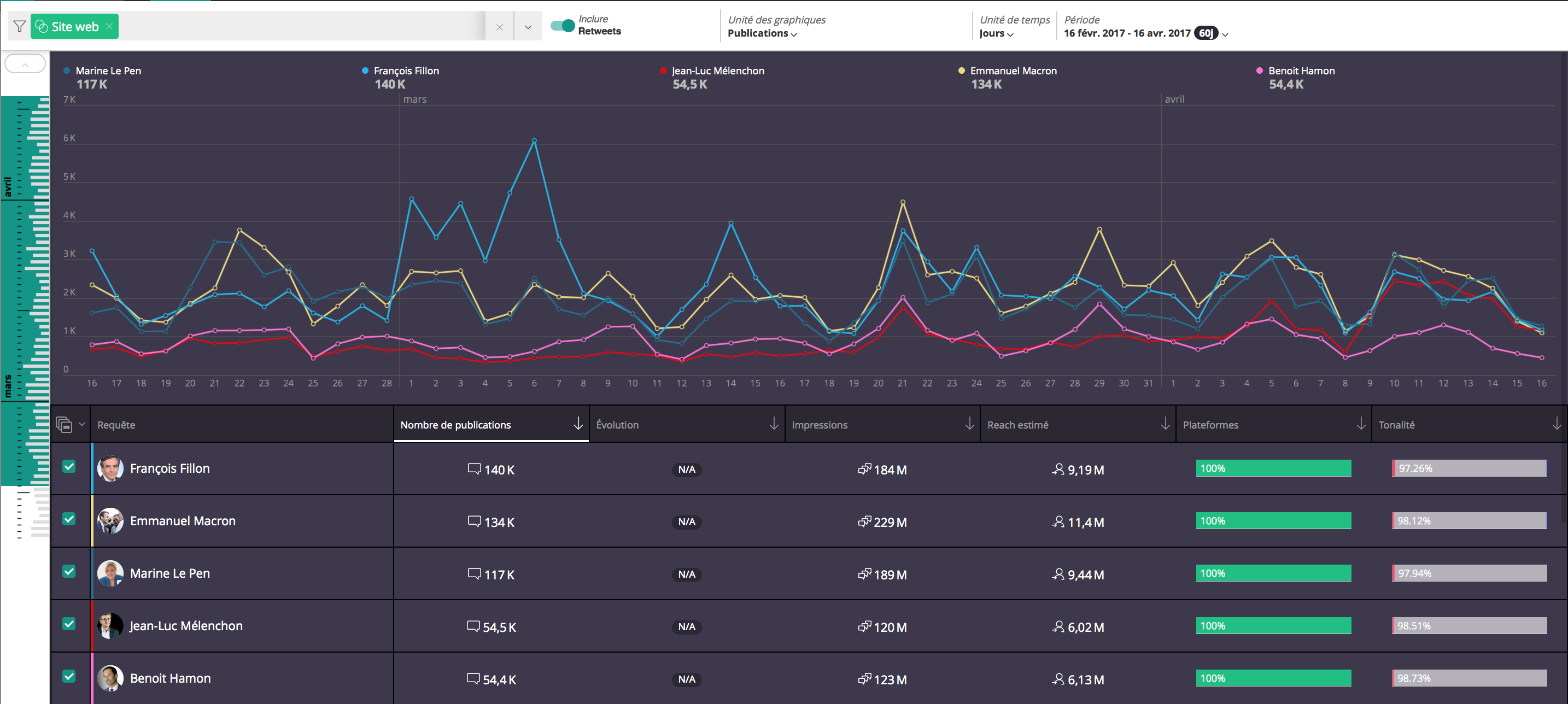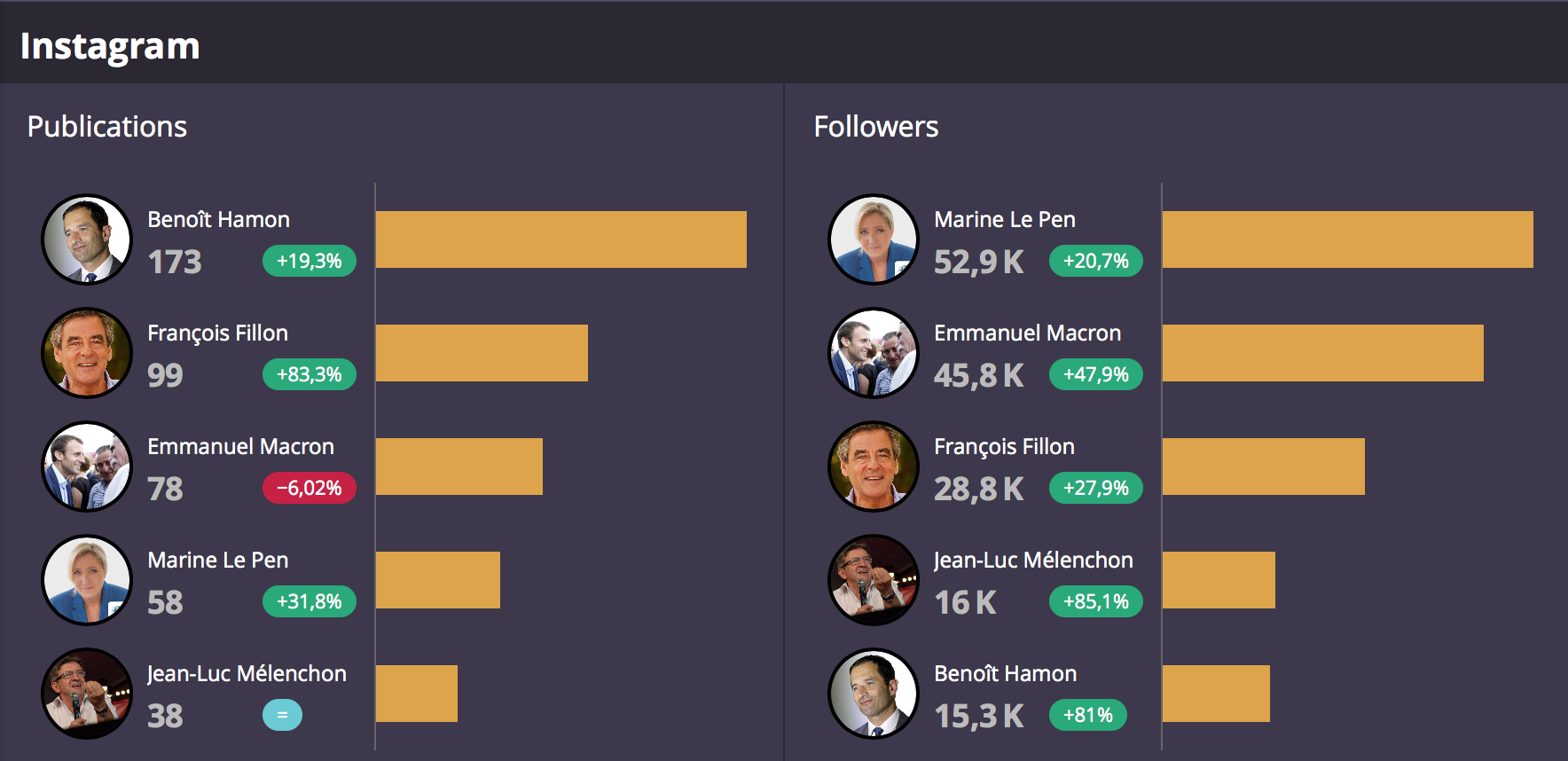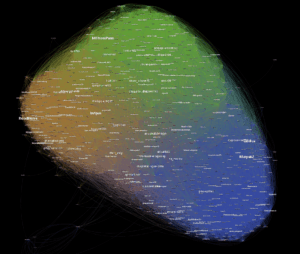Sommaire
If we listen to the indicators coming from the social networks, Mélenchon and Le Pen would be in the second round
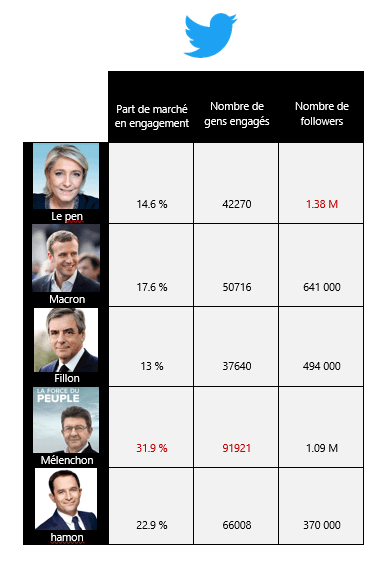
At every election, I try to deliver the candidates' key social media indicators before the polls. The aim? To avoid any after-the-fact analysis by the social network witchdoctors. In an election where fake polls have been cropping up here and there (Filteris, can you hear me?), this work seems to me to be more than necessary. According to this one, Mélenchon would win by a wide margin ahead of Marine Le Pen. Thanks to Visibrain, Talkwalker, SoPrism and Brandwatch.
The main findings
1. If social networks were to vote: Mélenchon wins ahead of Le Pen
Let's be clear: in my opinion, these indicators are worthless. They're just an indicator that social networks are performing well, but they're not proof of any future result at the ballot box. In fact, I dare to hope that the indicators will fail miserably this Sunday.
- Mélenchon would come out on top: better engagement on Twitter and Facebook, more people with an interest according to Facebook, more views on YouTube, bigger community during the debates. He outperforms everyone.
- Le Pen would be second: most followers on Twitter and Instagram, second on most indicators where Melenchon performs well.
- Macron would be third: the candidate who manages to engage the other candidates' Twitter followers the most, with the biggest gain in Facebook fans and the highest reach on Facebook public pages (although this needs to be tempered, as there is a lot of negative content).
- Fillon would come 4th: the only indicator he has is the number of comments on his Facebook page.
- Hamon would come last. He only emerges on one indicator.
2. Mélenchon and Macron, the candidates most criticised by others
Macron and Mélenchon are clearly among the most criticised. However, Fillon also has a community that assiduously criticises him, but this opposition forms a homogeneous whole that gives us a polarised crowd in conversation.
3. A quick portrait of the candidates
Mélenchon: a top performer on social networks, he has the best indicators on almost all social networks. He has succeeded in capturing a young audience, as can be seen in the article on Facebook. His most frequently used words are the Republic, retirement at 60, ecology, social struggles, wages and citizen revolution.
Marine Le Pen: lying in ambush of Mélenchon, she is doing well on the main social media. Her most-tweeted themes include Islamism, national borders and economic patriotism. She receives very little criticism from others, even though she is the only one with a supportive international anti-Islam community.
Macron: his indicators are far from the best. It would seem that there are above all organisational problems. In the most tweeted words: terrorism, the "project", the country. Then we find the middle classes, work and culture.
Fillon: After a period of inactivity due to his problems, François Fillon was very active during March. His expressions are strongly anchored in France, freedom, work and farmers. Compared with the others, his campaign themes include European power, Islamic totalitarianism, culture, security and the middle classes. François Fillon is particularly polarising, with the crowd divided between those who are pro-Fillon (green) and those who are anti-Fillon (red). His community remains very small, but is extremely active and well organised.
Hamon: far behind the others, Hamon is struggling a little. Expressions include universal income, democracy, teachers, ecological transition and public service.
Contents
I . Comparing the different social networks II.General discussions III. Profiles of each candidate based on social networksI. Comparing the different social networks
Twitter

In terms of engagement, Jean-Luc Mélenchon is well ahead of the others with a 31.9% share of engagement. The number of followers is the same for Marine Le Pen, but these figures are worth little insofar as the number of fake and inactive users must be particularly high. It is then interesting to look at the concordance of engaged audiences. It can be read from horizontal to vertical:
Example: 5.6% of people who interacted with Le Pen also interacted with Macron, while 4.6% of those who interacted with Macron also interacted with Le Pen, etc.
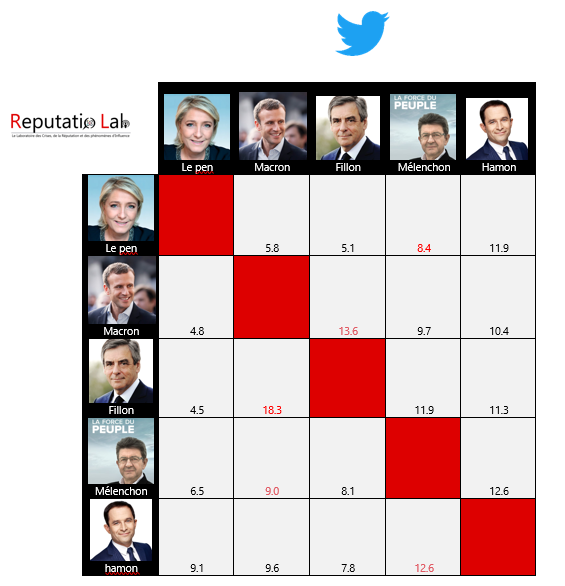
In terms of followers, the person who has gained the most in percentage terms over the last 2 months is Emmanuel Macron. This is quite logical insofar as he had an account with a very low follower count.
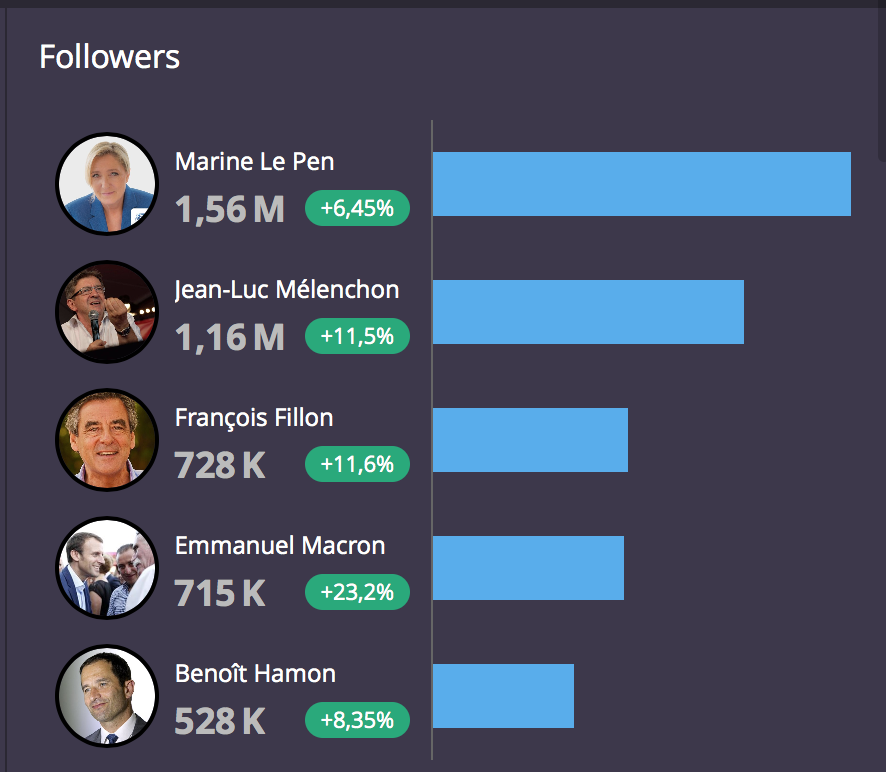
b) Demographic analysis
Mélenchon and Macron have the least female followers on Twitter. In contrast, Hamon has the most female followers. Geographically, all the candidates are well distributed, unlike during the primaries. The only difference is that Marine Le Pen has fewer followers in the Paris region than the others.
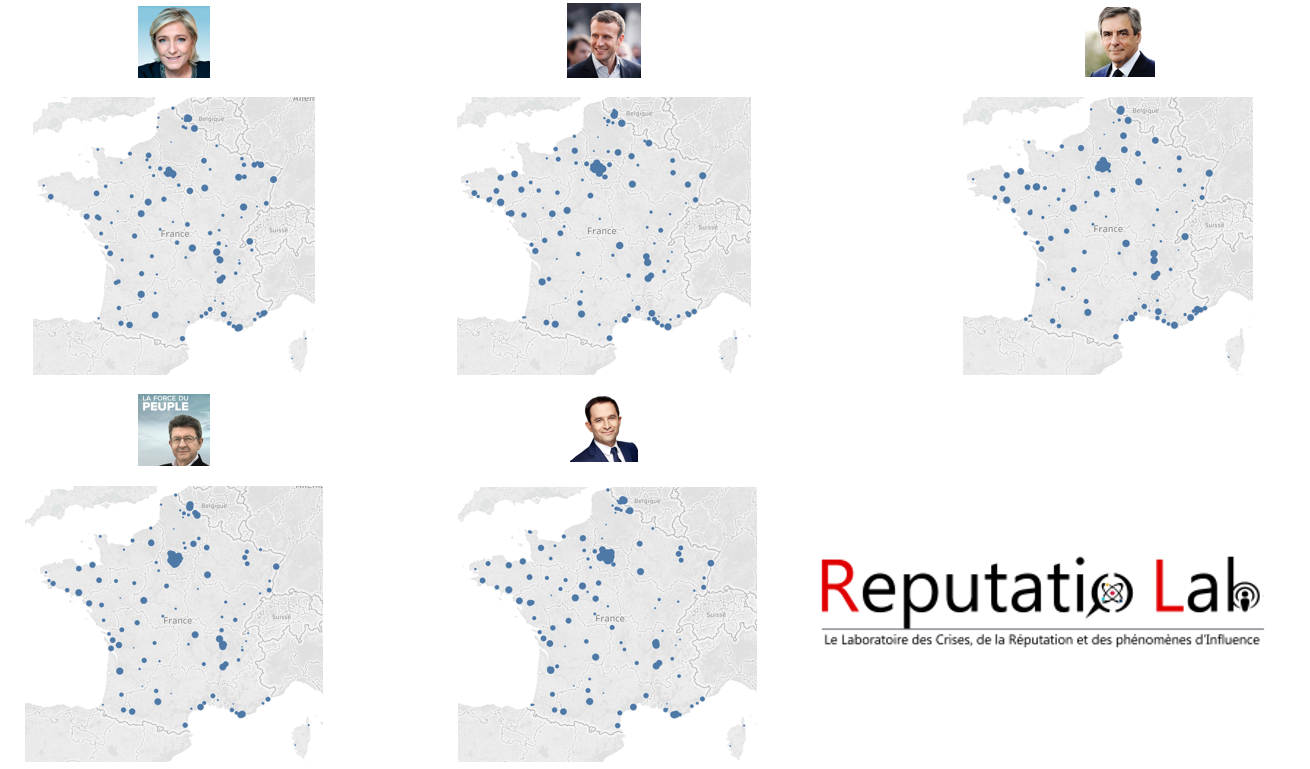
2. Facebook
Back to Contents Among those who have expressed an interest in a candidate according to Facebook, Mélenchon is the clear winner ahead of Marine Le Pen.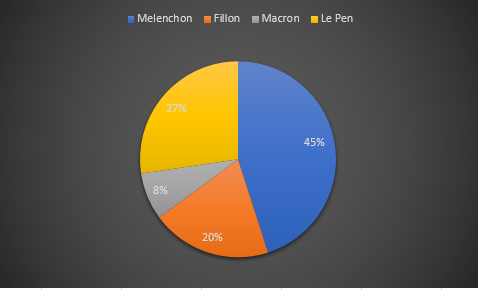 In the complete statistics based on the last month this time, Mélenchon also wins: more shares (double Fillon's, triple Hamon's!) and even on comments. ( Error for Macron, it's 104,843 shares)
In the complete statistics based on the last month this time, Mélenchon also wins: more shares (double Fillon's, triple Hamon's!) and even on comments. ( Error for Macron, it's 104,843 shares)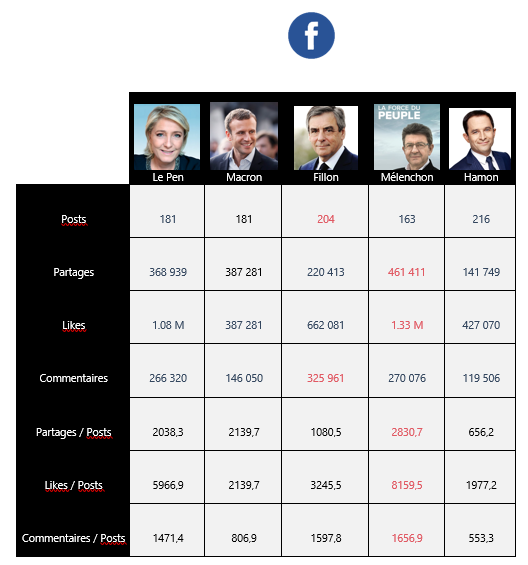 In the Benchmark provided by Radarly, the ranking based on 2 months is more or less the same.
In the Benchmark provided by Radarly, the ranking based on 2 months is more or less the same. In terms of gender, the figures are obtained via So Prism, and therefore via people who, according to Facebook, have an interest in the candidates. Emmanuel Macron is clearly the candidate who attracts the least interest from women, which confirms the statistics on Twitter.
In terms of gender, the figures are obtained via So Prism, and therefore via people who, according to Facebook, have an interest in the candidates. Emmanuel Macron is clearly the candidate who attracts the least interest from women, which confirms the statistics on Twitter.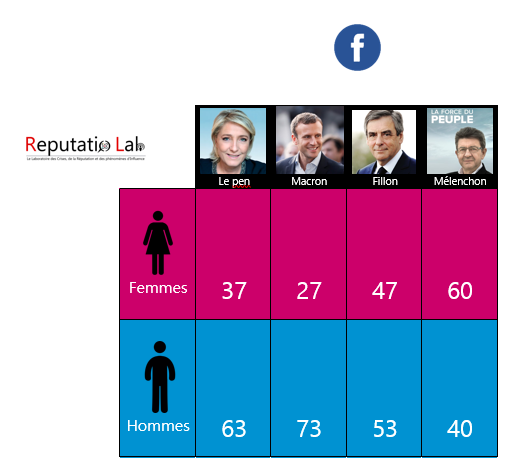 Among all the public pages on Facebook, however, Macron stands out in terms of the number of reaches:
Among all the public pages on Facebook, however, Macron stands out in terms of the number of reaches: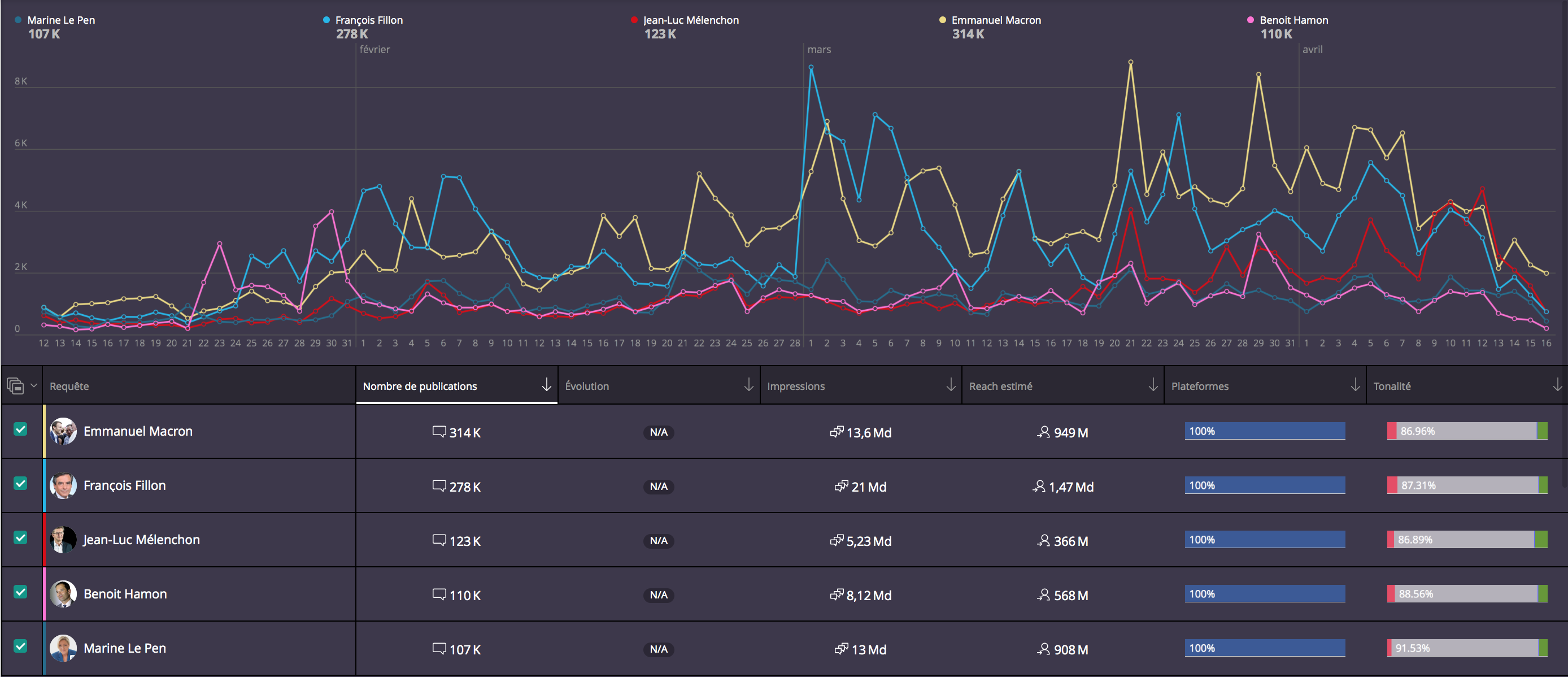
3. The others in bulk
Back to Contents On websites, Fillon is the most mentioned (surely because of the affairs) ahead of Macron and Le Pen :II. The big picture
Back to Contents If we look at the whole of the presidential election over the last two months, we see an incredible volume of almost 38 million tweets! The pace of activity has been set by the debates. The most frequently mentioned candidates are Emmanuel Macron and François Fillon :
The most frequently mentioned candidates are Emmanuel Macron and François Fillon : As usual, debates dominate the exchanges. Jean-Luc Mélenchon has the most tweeted slogan hashtag, ahead of Fillon and Marine.
As usual, debates dominate the exchanges. Jean-Luc Mélenchon has the most tweeted slogan hashtag, ahead of Fillon and Marine. The mapping of hashtags shows above all a capitalisation around Macron, the target of all the candidates.
The mapping of hashtags shows above all a capitalisation around Macron, the target of all the candidates.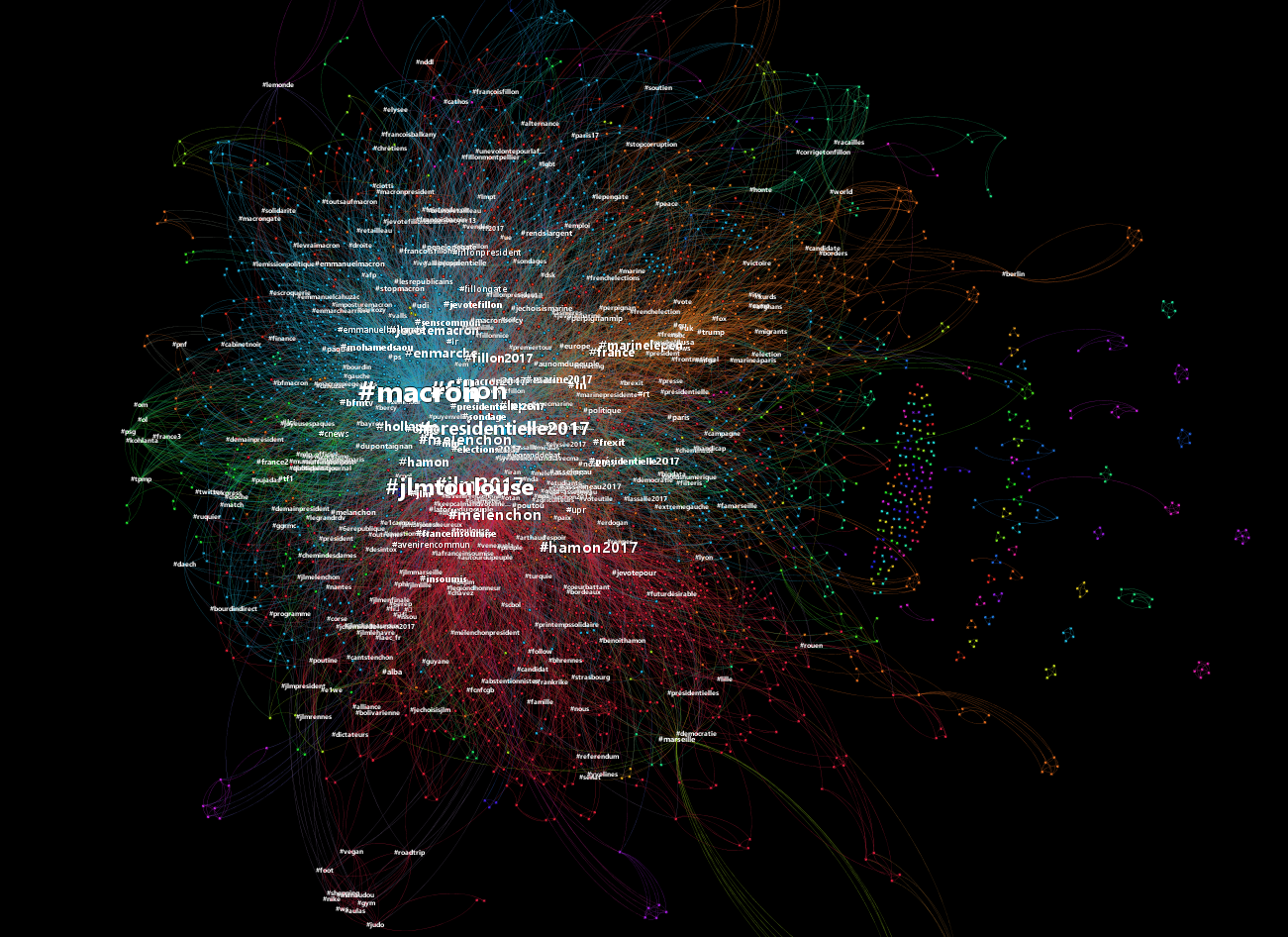 As noted in the comparative indicators between the candidates, all the exchanges are dominated by a very male audience:
As noted in the comparative indicators between the candidates, all the exchanges are dominated by a very male audience: As a sign that Filteris-type studies should always be treated with great caution (and why this one should be taken with a grain of salt), here are the occupations listed in the most frequently used biographies:
As a sign that Filteris-type studies should always be treated with great caution (and why this one should be taken with a grain of salt), here are the occupations listed in the most frequently used biographies: Unsurprisingly, journalist, activist and local councillor stand out. The most frequently mentioned over the last two months are Fillon, Macron and Le Pen.
Unsurprisingly, journalist, activist and local councillor stand out. The most frequently mentioned over the last two months are Fillon, Macron and Le Pen.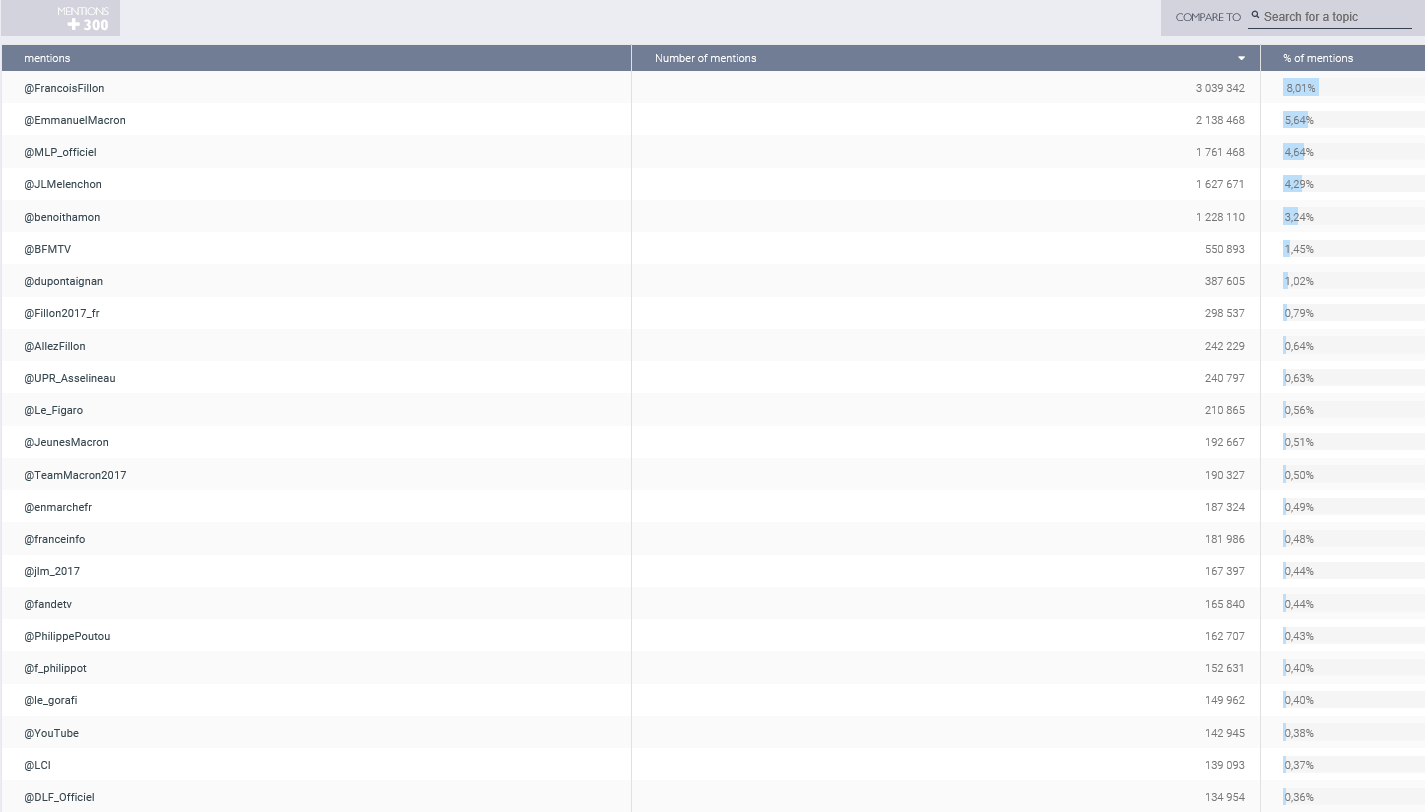 As a reminder, during the first debate, Mélenchon (9%) won ahead of Le Pen (7.6%) and Macron (7.2) in terms of community size:
As a reminder, during the first debate, Mélenchon (9%) won ahead of Le Pen (7.6%) and Macron (7.2) in terms of community size: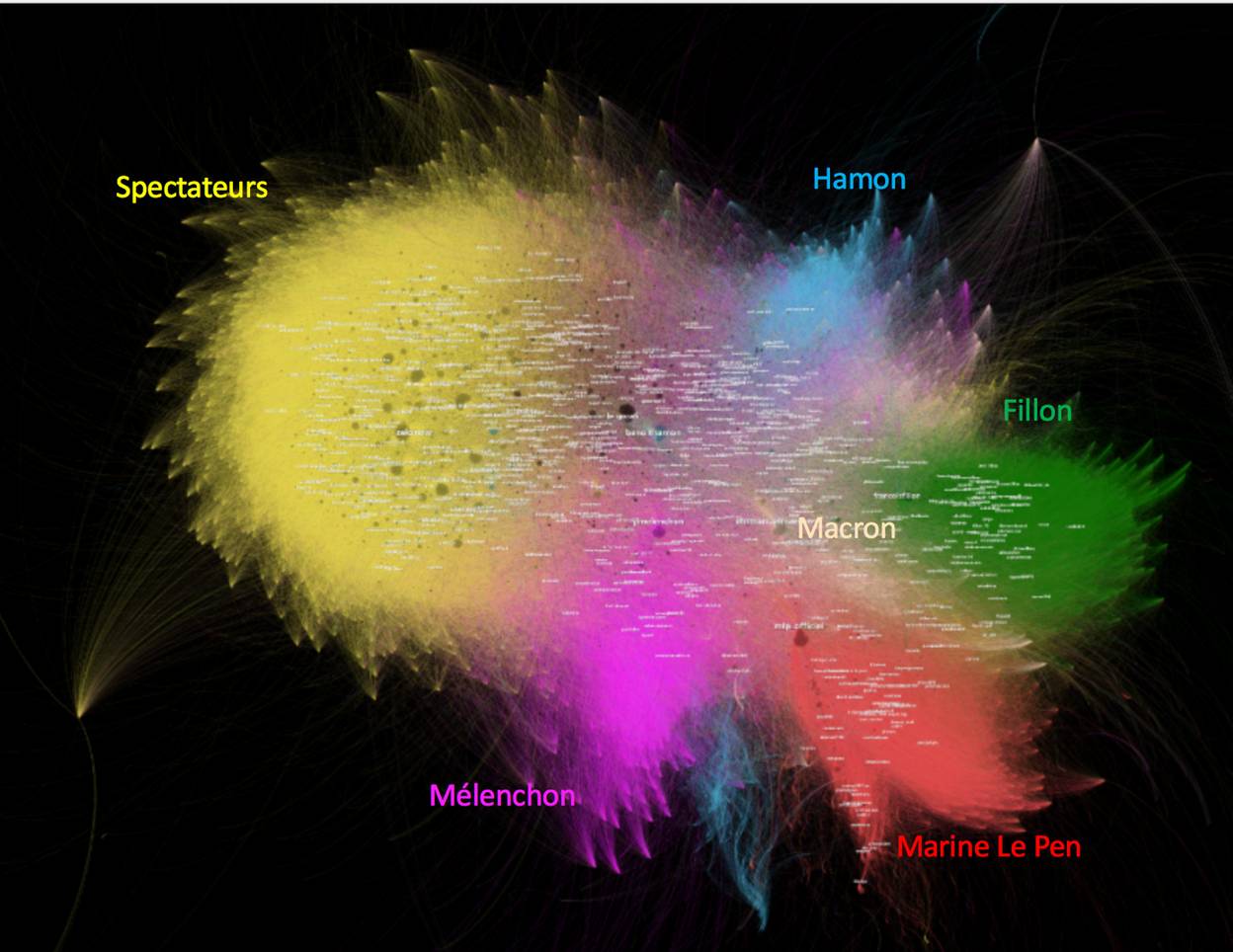
III. By candidate
1. Marine Le Pen
Back to Contents a) her digital portrait on Twitter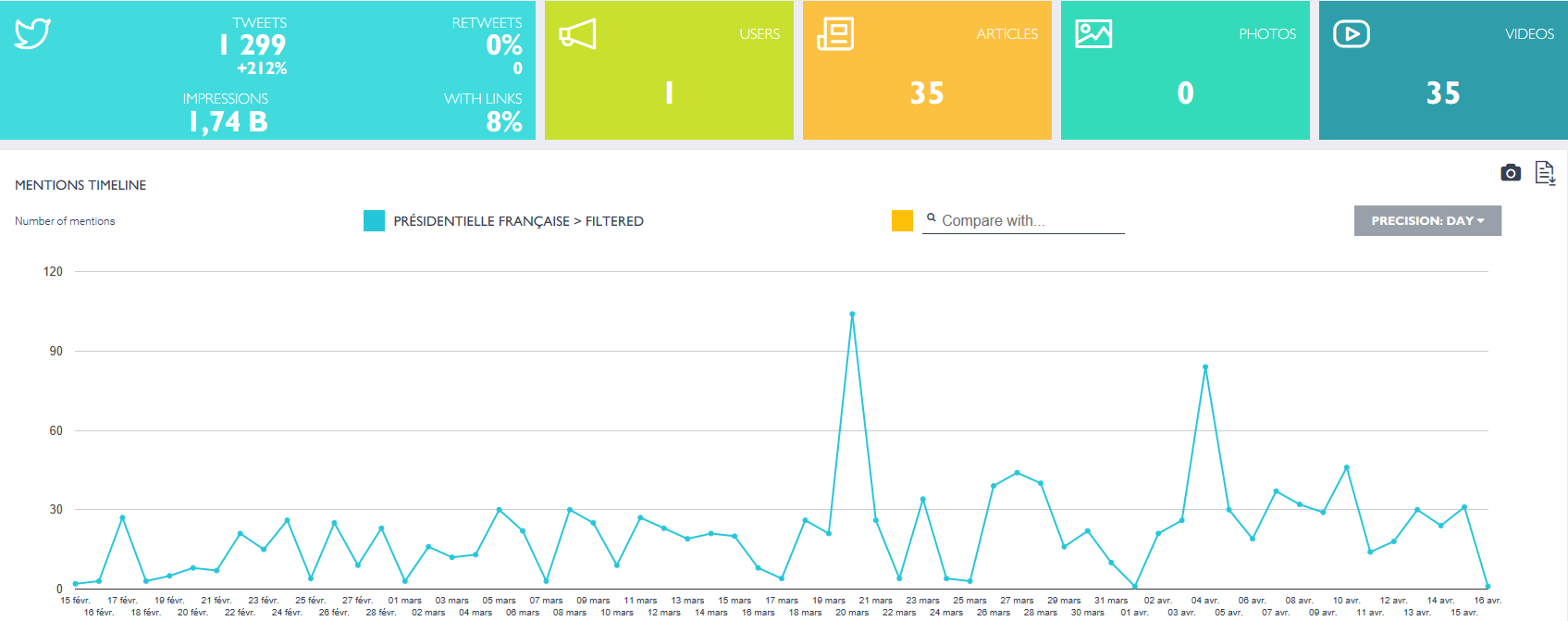
Marine Le Pen's activity has intensified over the past month. She is the least active of the candidates on Twitter. Like most of them, she has mainly been talking about the presidential debates. Among her most tweeted themes: Islamism, national borders and economic patriotism.
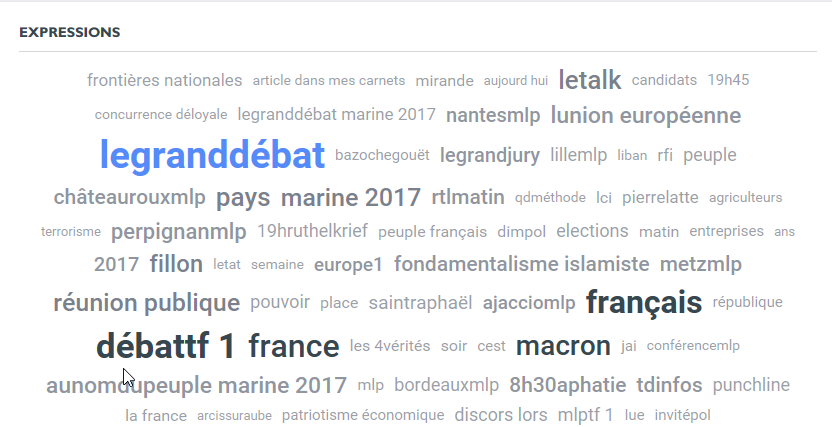
In the hashtags, above all the various political meetings and broadcasts. You can also see that she mentions Macron and Fillon a lot.
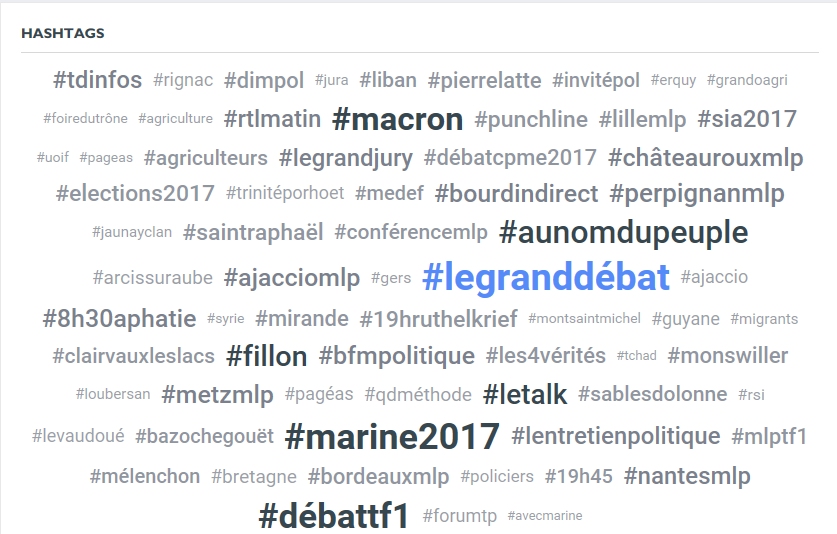 b) Her audience
b) Her audience Its Twitter audience is essentially male. This audience is present regionally, but not very much in Paris.
Its Twitter audience is essentially male. This audience is present regionally, but not very much in Paris.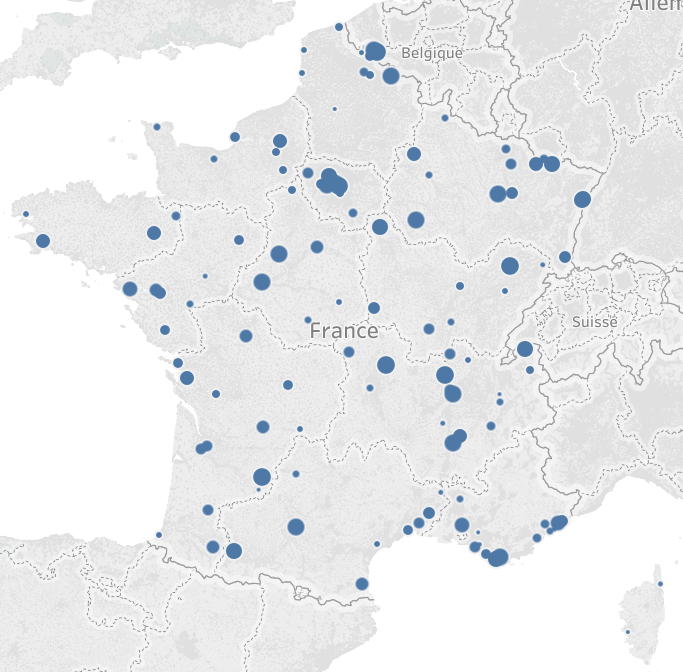 In Marine Le Pen's ecosystem, there are very few people who criticise her.
In Marine Le Pen's ecosystem, there are very few people who criticise her.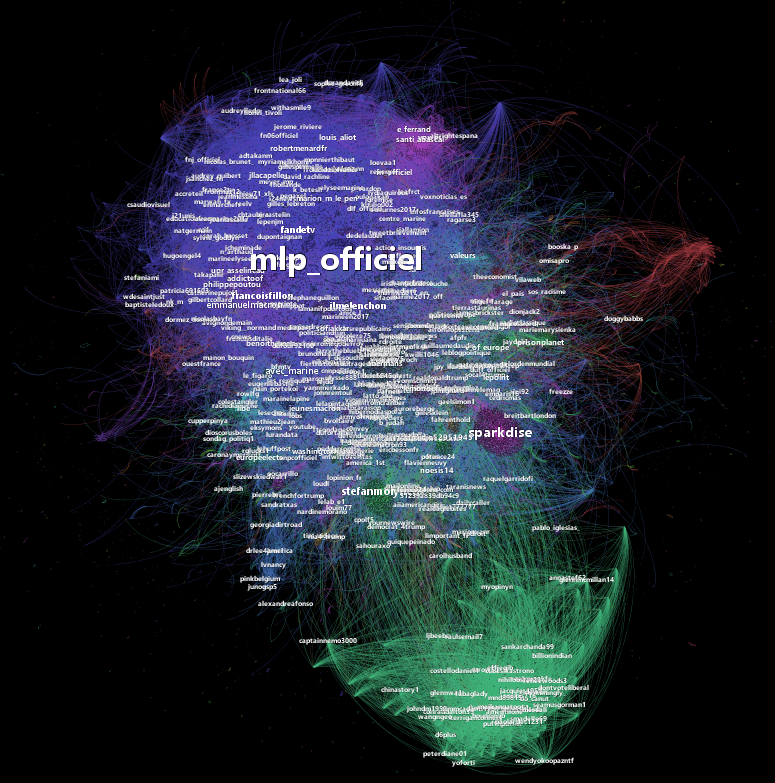 The community at the bottom is actually an international community that supports her. This community is nationalist and anti-Muslim.
The community at the bottom is actually an international community that supports her. This community is nationalist and anti-Muslim.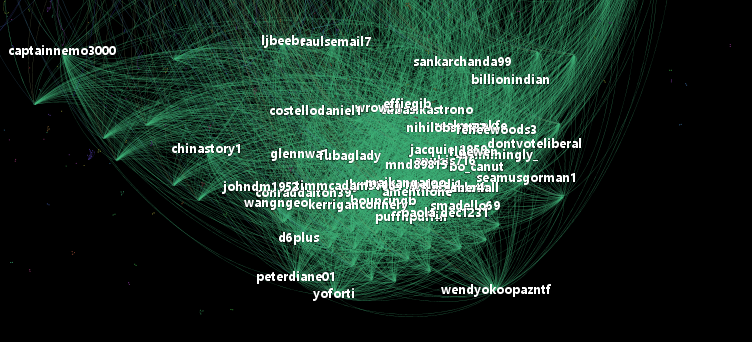 c) What Twitter has to sayThe analogies with Trump are there. We're talking about him in relation to the other candidates and in relation to the polls.
c) What Twitter has to sayThe analogies with Trump are there. We're talking about him in relation to the other candidates and in relation to the polls.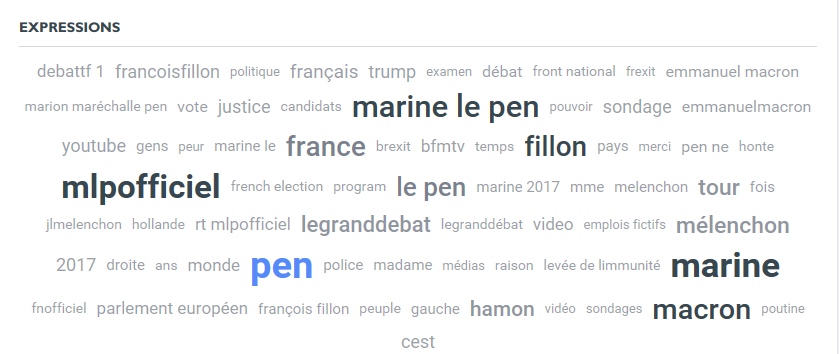 In the most retweeted tweets, mainly criticism of him. With the punchlines of the debates: ventriloquism and worker immunity.
In the most retweeted tweets, mainly criticism of him. With the punchlines of the debates: ventriloquism and worker immunity.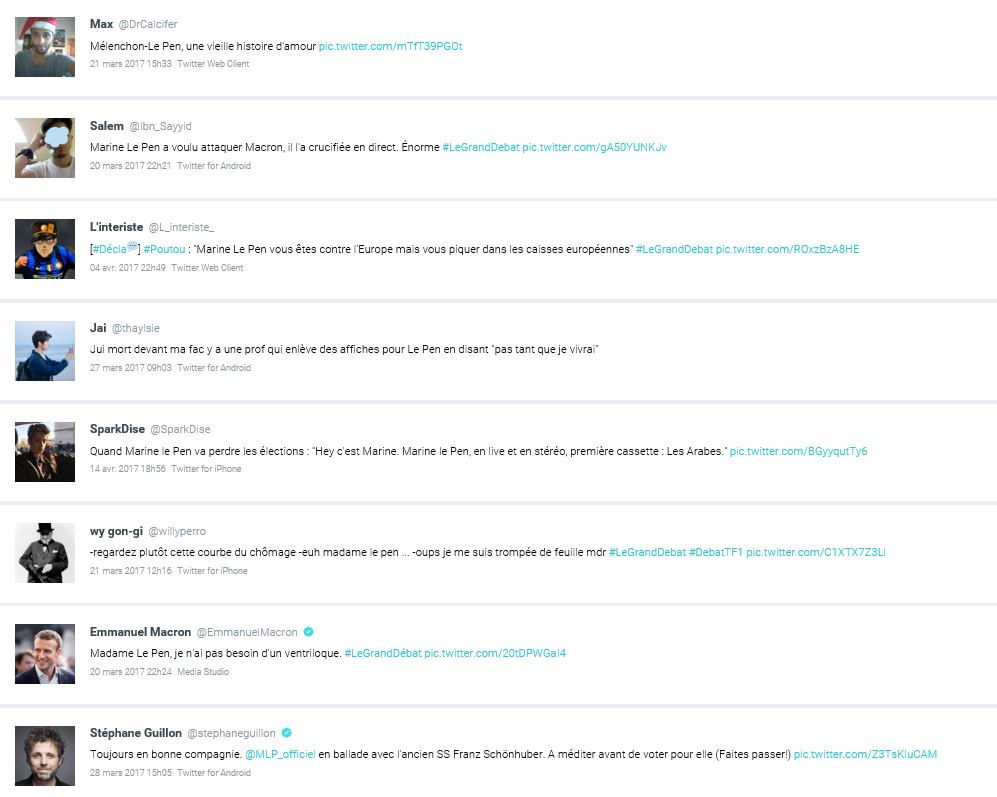
2. Emmanuel Macron
Back to Contents a) His digital portrait on Twitter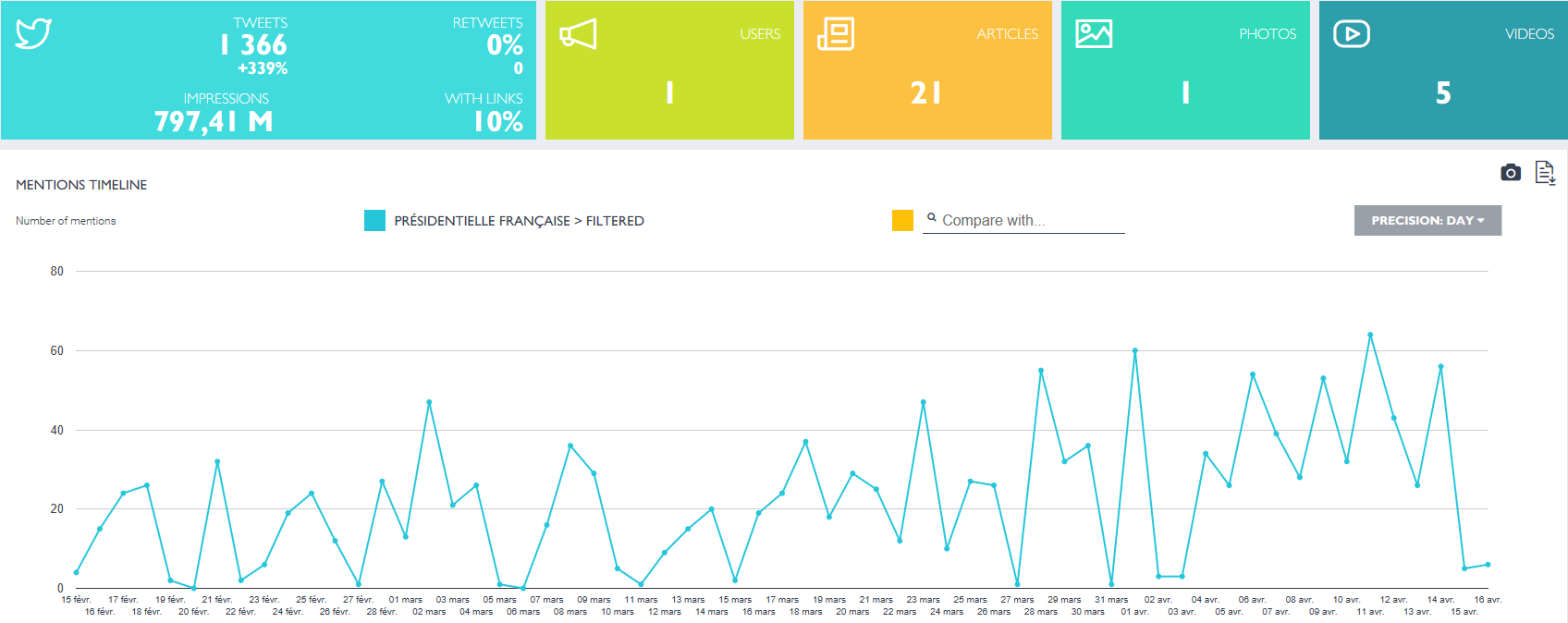 Emmanuel Macron's activity is constant, with periods of rest. The hashtags are mainly about debates, political programmes and meetings. Unlike Marine Le Pen, his opponents are not mentioned.
Emmanuel Macron's activity is constant, with periods of rest. The hashtags are mainly about debates, political programmes and meetings. Unlike Marine Le Pen, his opponents are not mentioned.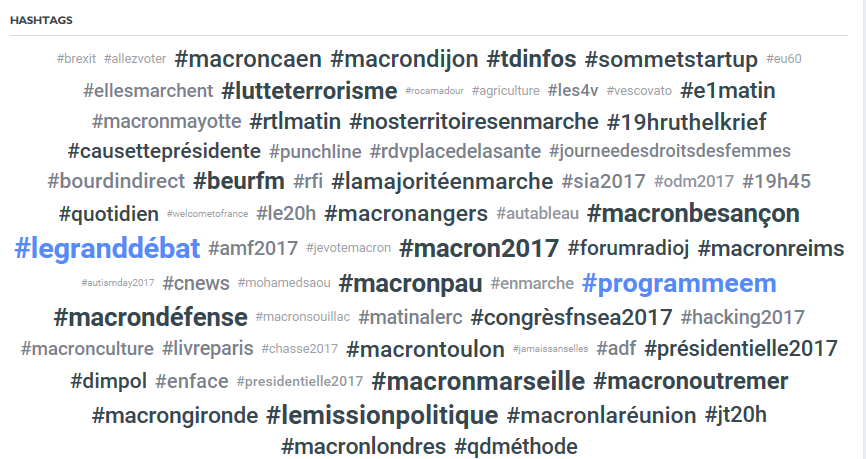 In the most tweeted words: terrorism, the "project", the country. Then we find the middle classes, work and culture.
In the most tweeted words: terrorism, the "project", the country. Then we find the middle classes, work and culture.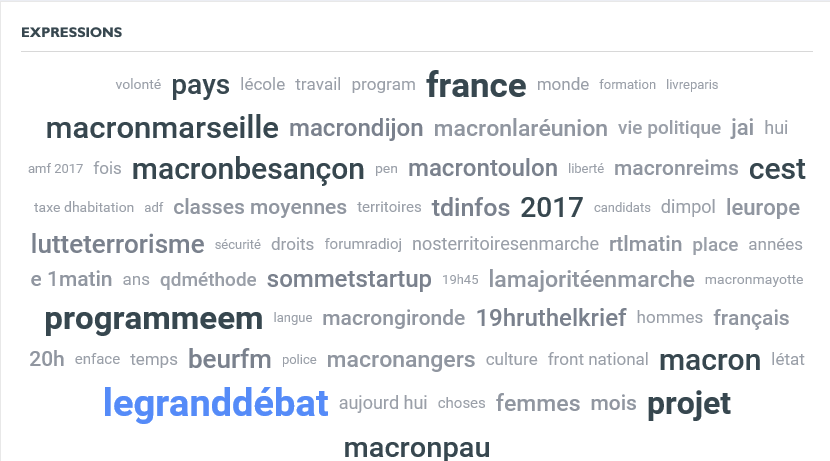 b) Its audience
b) Its audience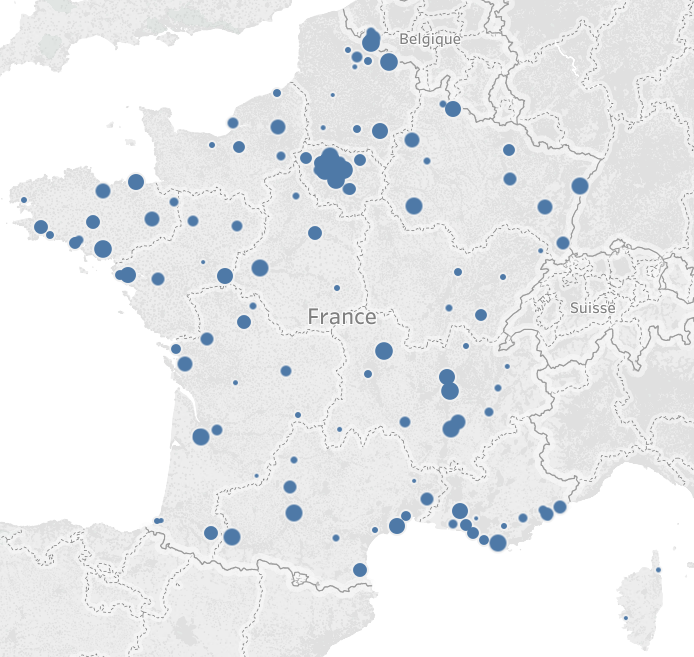 A sparse audience with a strong male presence.
A sparse audience with a strong male presence.
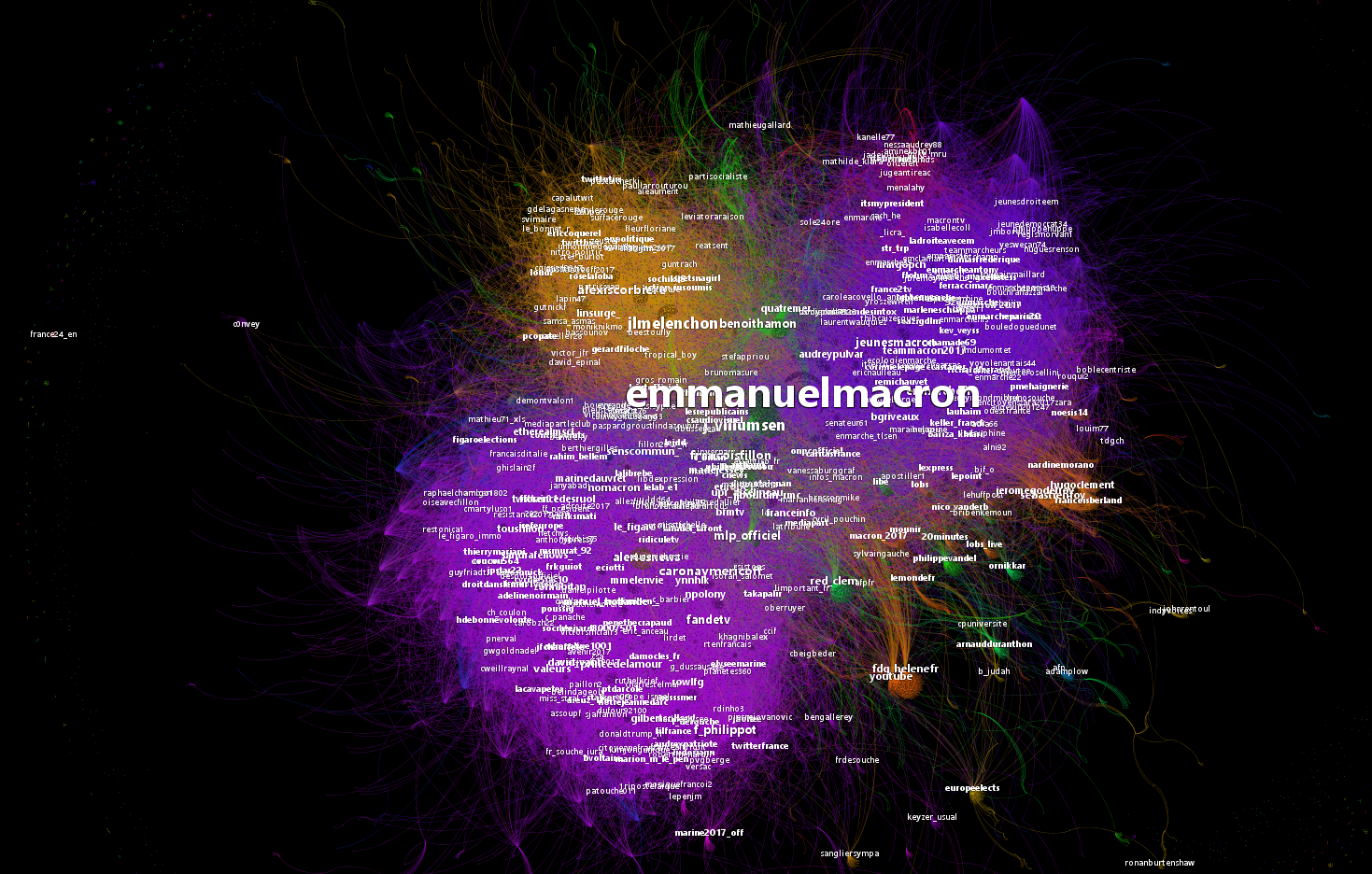 In his communities, we can see that he is under heavy attack from Mélenchon, the Fillonists in alliance with the Lepenists.c) What Twitter has to sayHere again, he is cited along with the other candidates and the polls. The Guyana episode is also visible.
In his communities, we can see that he is under heavy attack from Mélenchon, the Fillonists in alliance with the Lepenists.c) What Twitter has to sayHere again, he is cited along with the other candidates and the polls. The Guyana episode is also visible. In the top tweets, there are rarely any negative comments. Macron is only present as an element of context.
In the top tweets, there are rarely any negative comments. Macron is only present as an element of context.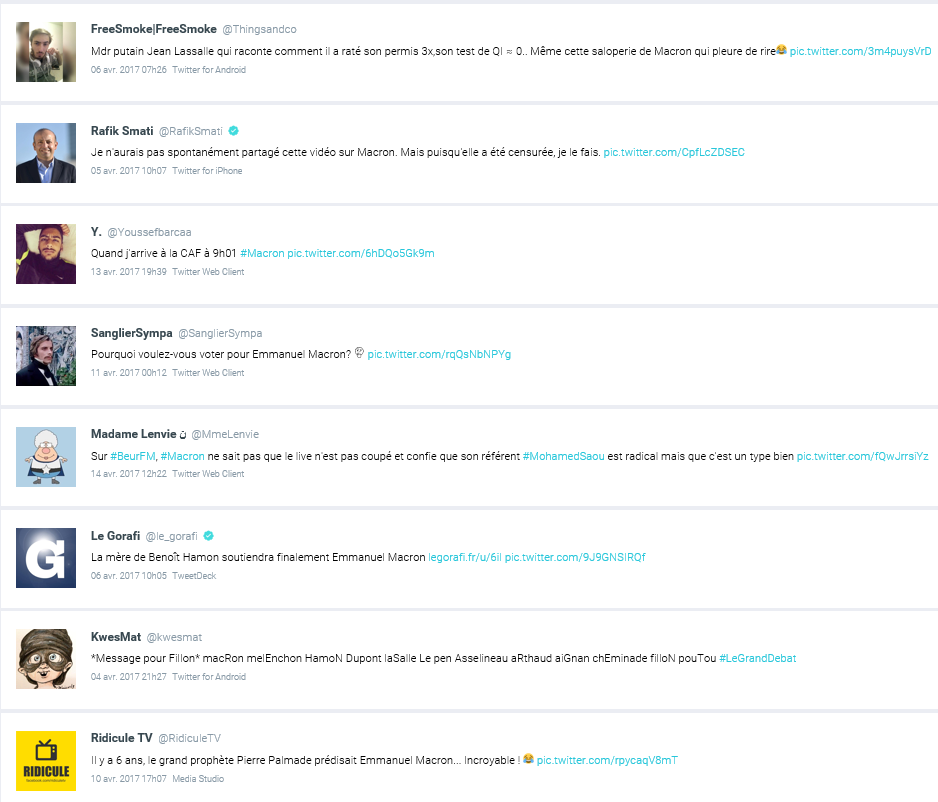
3. François Fillon
Back to Contents a) His digital portrait on Twitter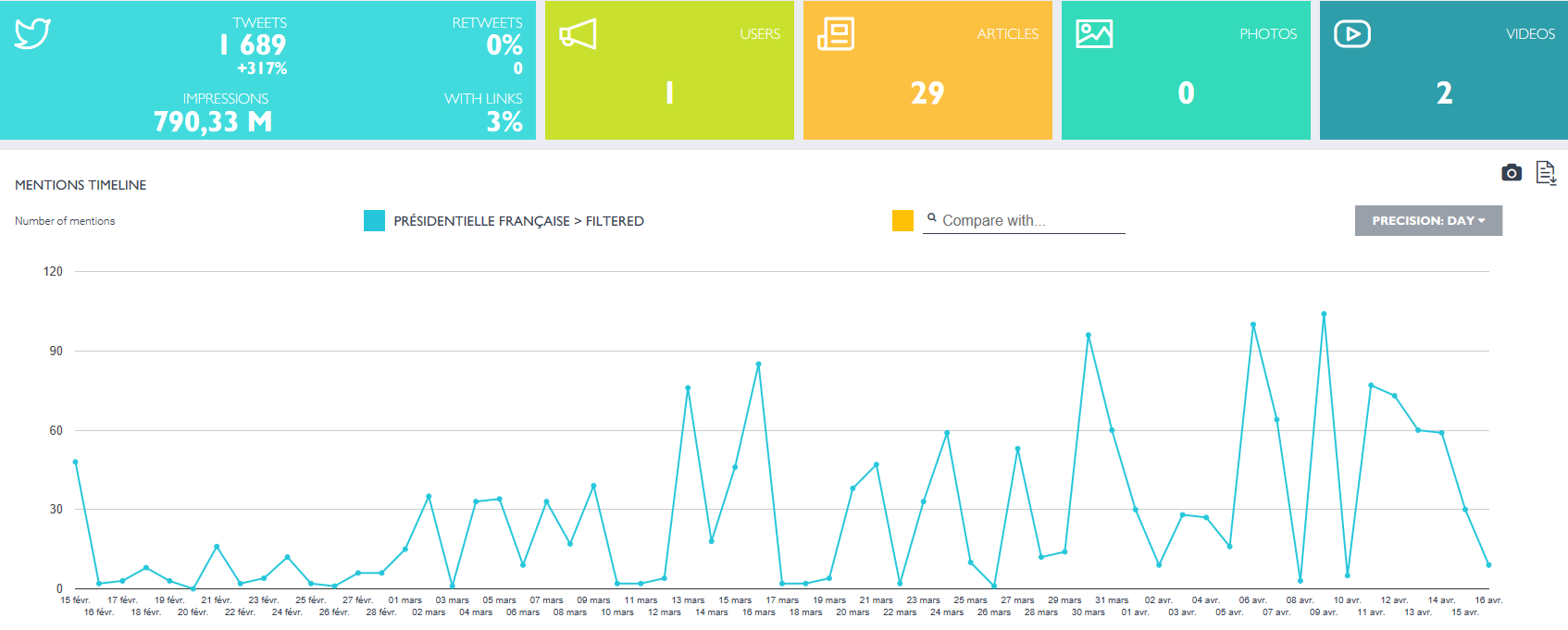
After a period of inactivity, François Fillon was very active during March. His expressions are strongly anchored on France, freedom, work and farmers. Compared with the others, his campaign themes include European power, Islamic totalitarianism, culture, security and the middle classes.
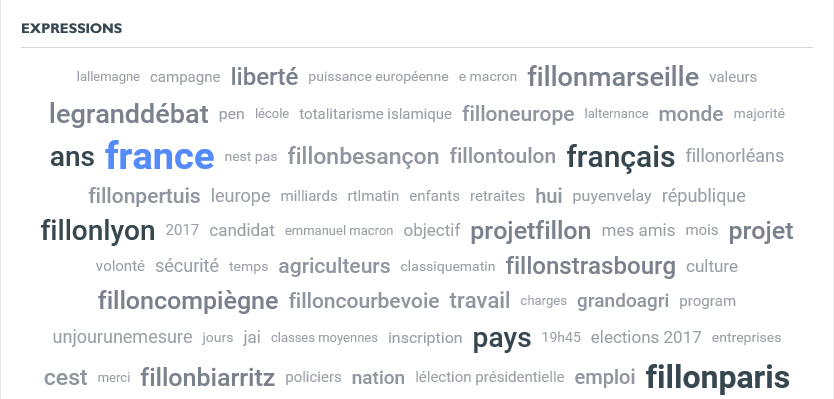 In hashtags, as with the others, it is the meetings that dictate the tempo:
In hashtags, as with the others, it is the meetings that dictate the tempo: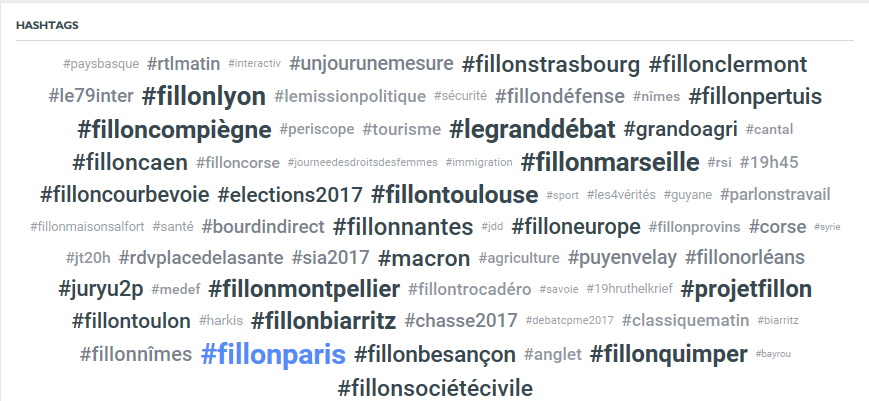 b) His audience
b) His audience The audience is predominantly male and locally dispersed:
The audience is predominantly male and locally dispersed: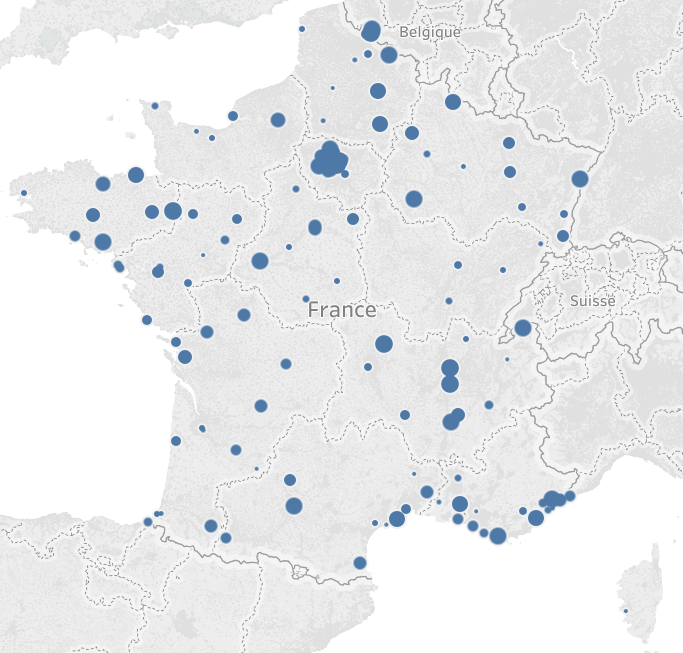 François Fillon is particularly divisive, as the crowd is polarised between those who are Pro-Fillon (green) and those who are anti-Fillon (red).
François Fillon is particularly divisive, as the crowd is polarised between those who are Pro-Fillon (green) and those who are anti-Fillon (red).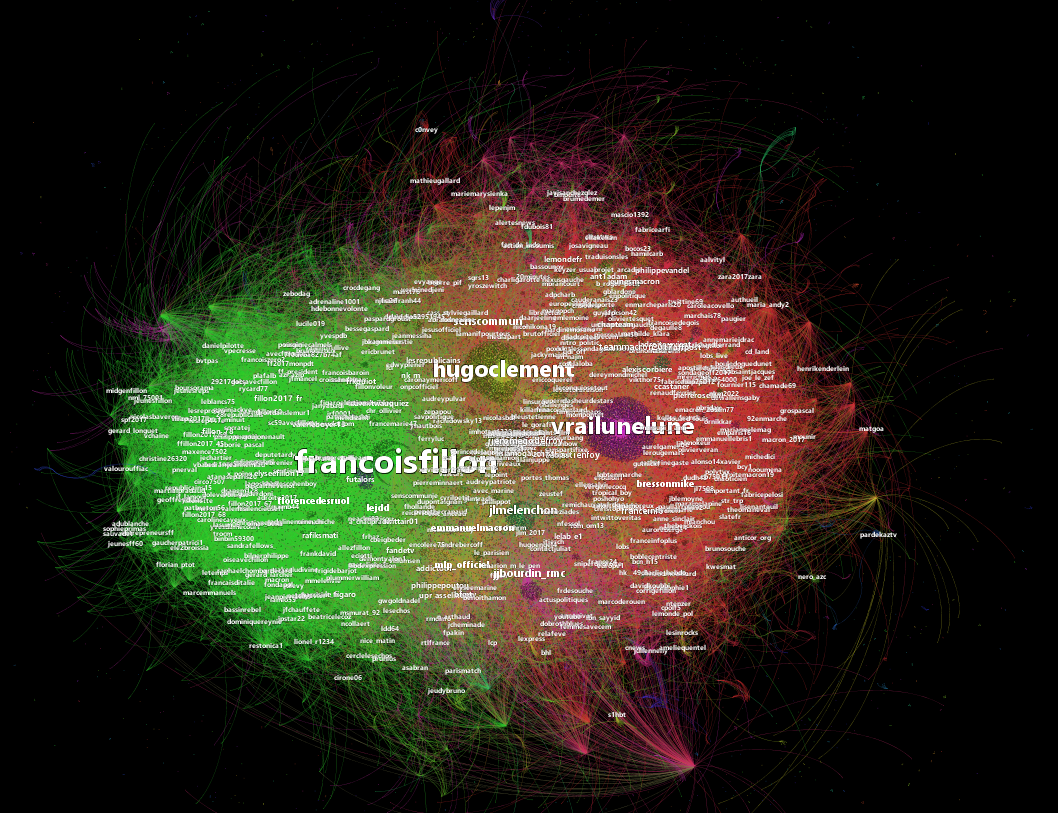 c) What Twitter is sayingThe words surrounding Fillon are rather negative: corruption, black cabinet, Mediapart, debt, Pénélope Fillon and Canard Enchainé.
c) What Twitter is sayingThe words surrounding Fillon are rather negative: corruption, black cabinet, Mediapart, debt, Pénélope Fillon and Canard Enchainé.
4. Jean-Luc Mélenchon
Back to Contents a) His digital portrait on Twitter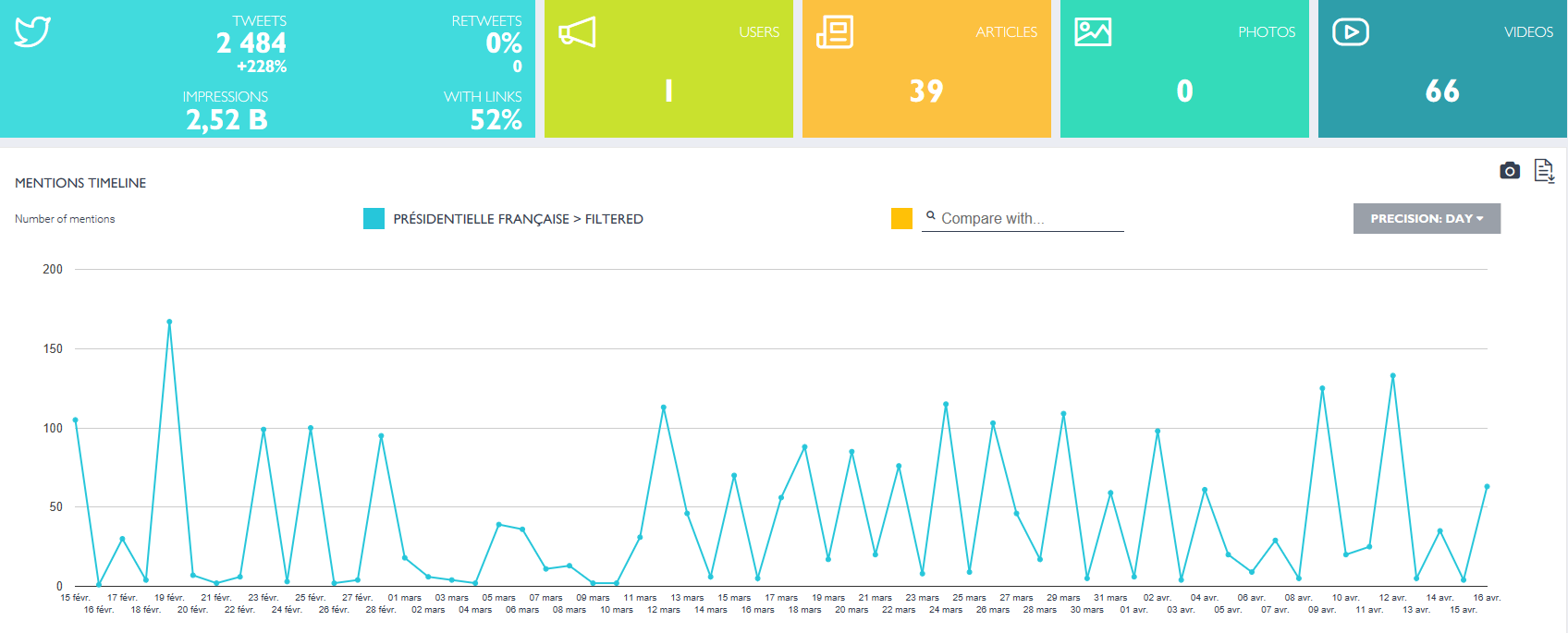 Clearly the most active. He also makes extensive use of YouTube. His activity is also heavily marked by live-tweet sessions. It's quite logical to find the meetings and broadcasts :
Clearly the most active. He also makes extensive use of YouTube. His activity is also heavily marked by live-tweet sessions. It's quite logical to find the meetings and broadcasts :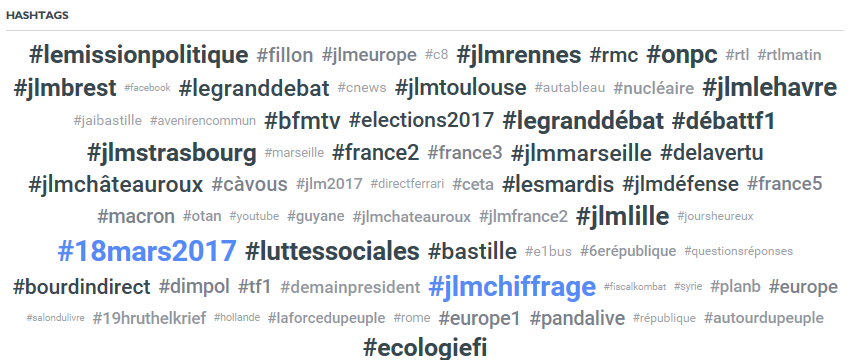 In the most used words, the Republic, retirement at 60, ecology, social struggles, wages and citizen revolution.
In the most used words, the Republic, retirement at 60, ecology, social struggles, wages and citizen revolution. b) Its audience
b) Its audience Once again, very male on Twitter and particularly present in the Paris region:
Once again, very male on Twitter and particularly present in the Paris region: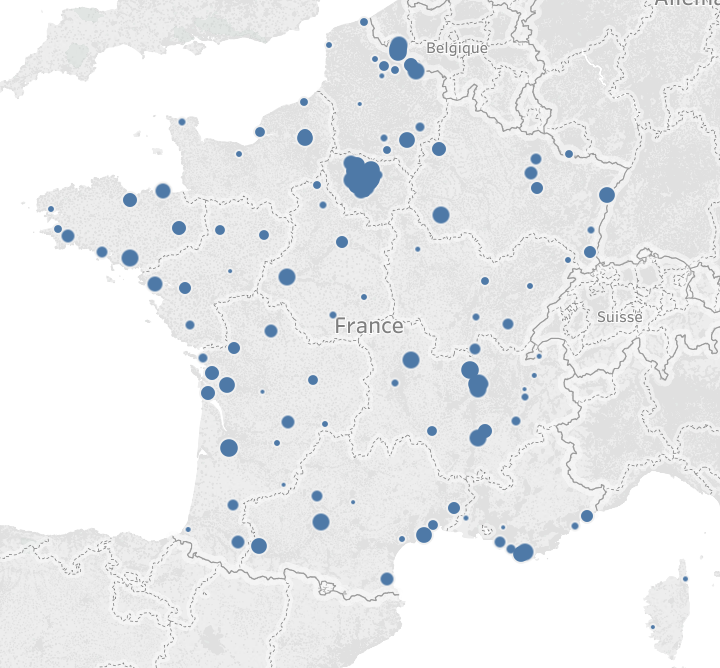 Mélenchon is also attacked by Macron (blue) and the Fillonists (pink)
Mélenchon is also attacked by Macron (blue) and the Fillonists (pink)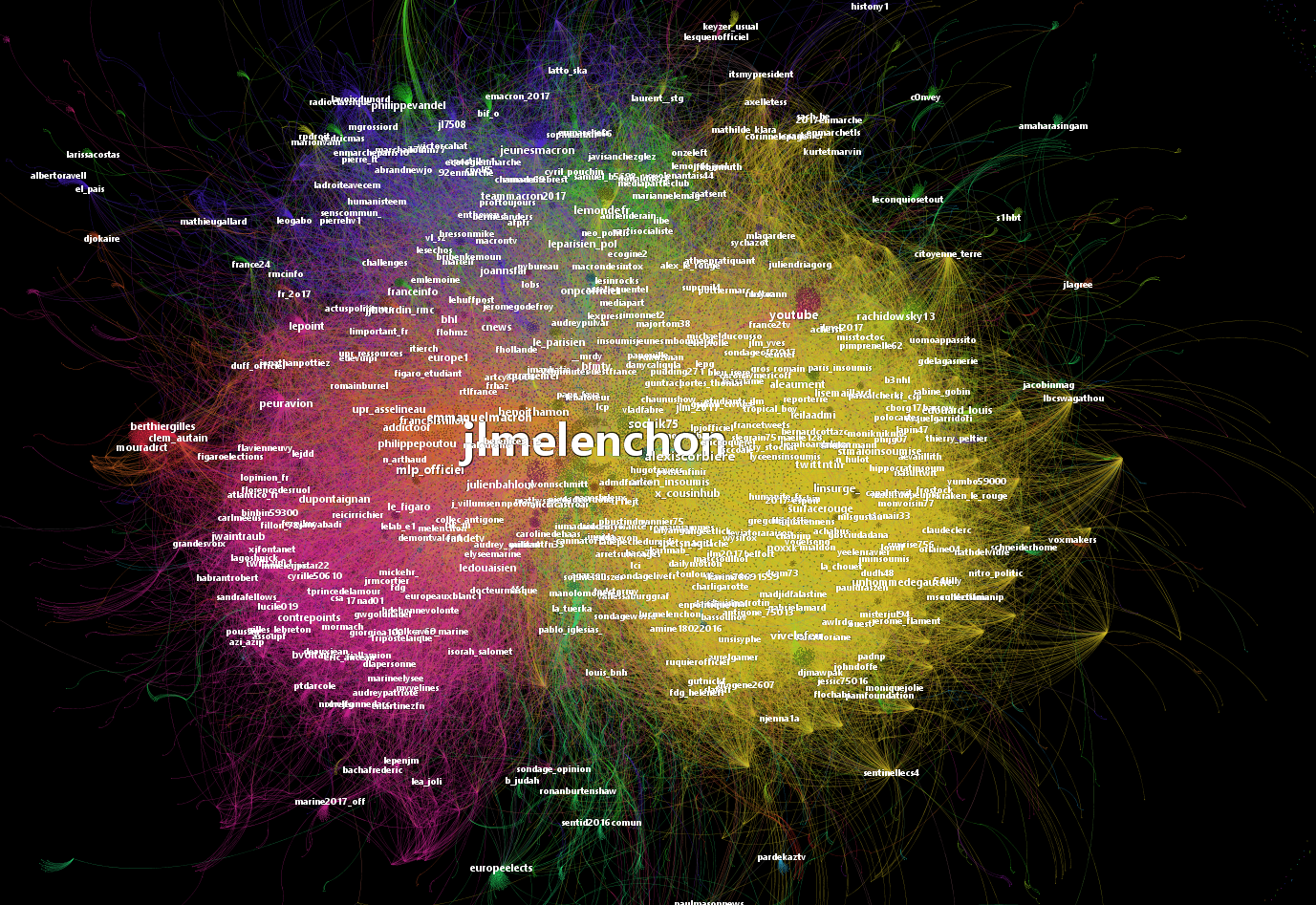 c) What Twitter is sayingMélenchon uses a lot of unusual words like YouTube, games and video, but nothing really tangible, either positive or negative.
c) What Twitter is sayingMélenchon uses a lot of unusual words like YouTube, games and video, but nothing really tangible, either positive or negative. In the top tweets, mostly non-negative comments from young people:
In the top tweets, mostly non-negative comments from young people: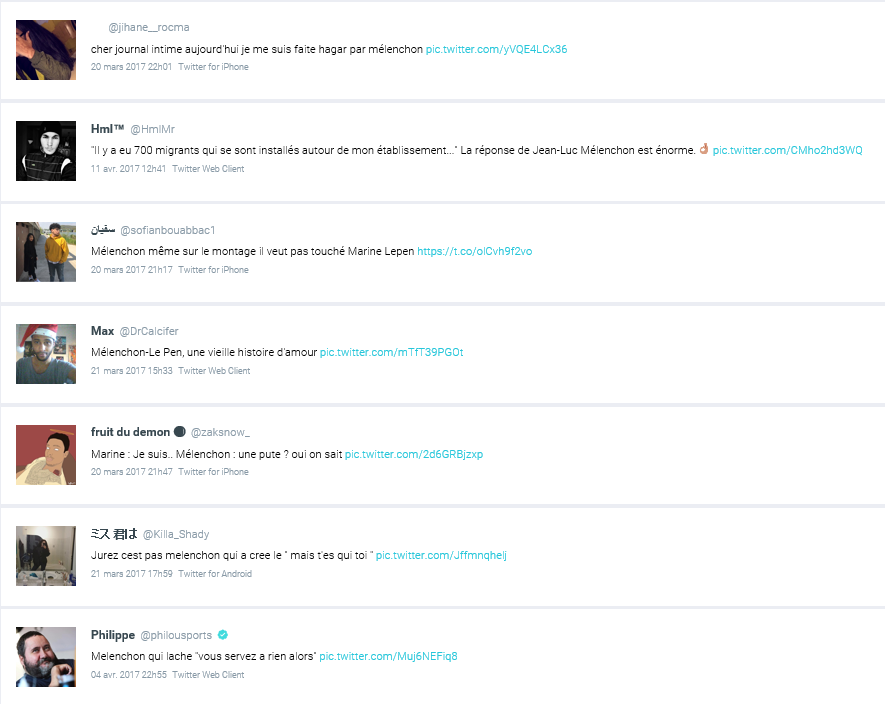
5. Benoit Hamon
Back to Contents a) His digital portrait on Twitter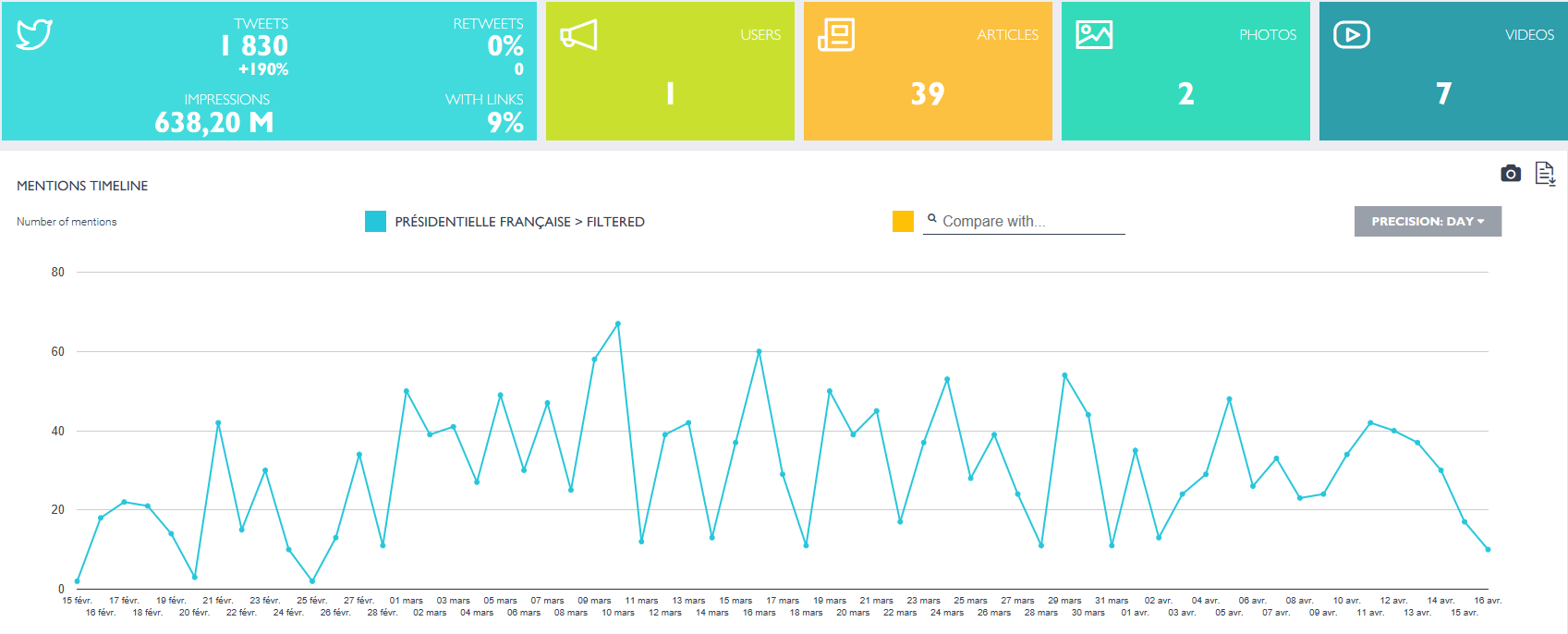 Benoit Hamon never takes a break from his activities.In the hashtags, as with the others, hashtags for broadcasts and meetings.
Benoit Hamon never takes a break from his activities.In the hashtags, as with the others, hashtags for broadcasts and meetings.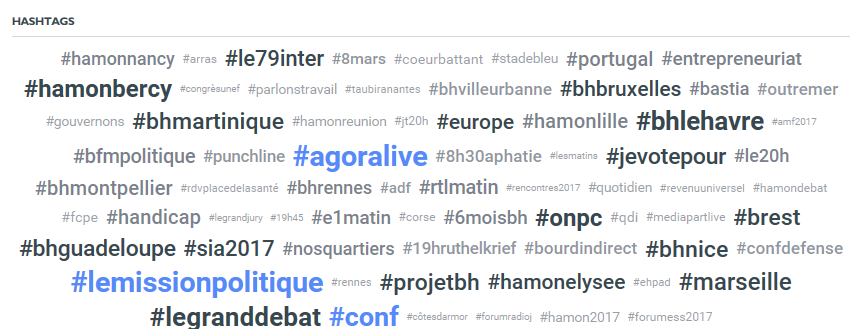 Expressions include universal income, democracy, teachers, ecological transition and public service.
Expressions include universal income, democracy, teachers, ecological transition and public service. b) Its audience
b) Its audience Predominantly male, but less so than the others, it is present everywhere and particularly well in the Paris region.
Predominantly male, but less so than the others, it is present everywhere and particularly well in the Paris region.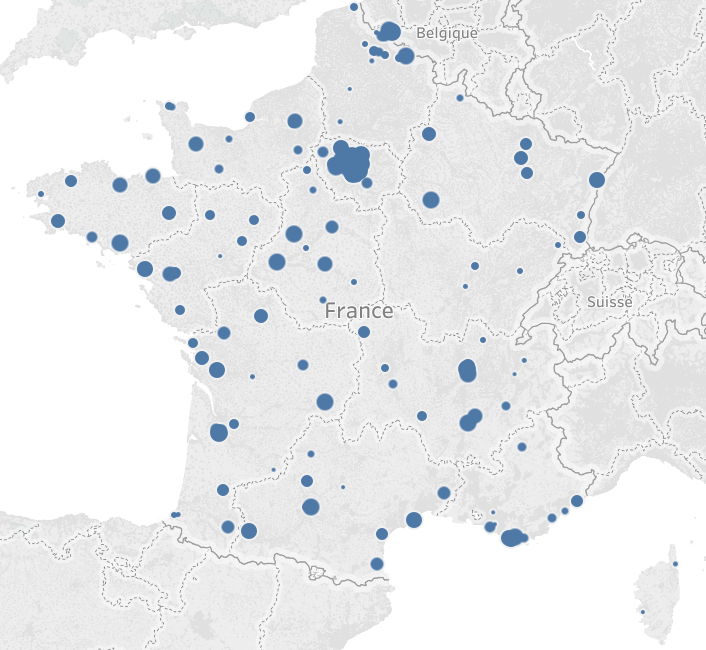 For Hamon, it's mainly his supporters who mention it. There are just a few Fillonist and Macronist communities.
For Hamon, it's mainly his supporters who mention it. There are just a few Fillonist and Macronist communities.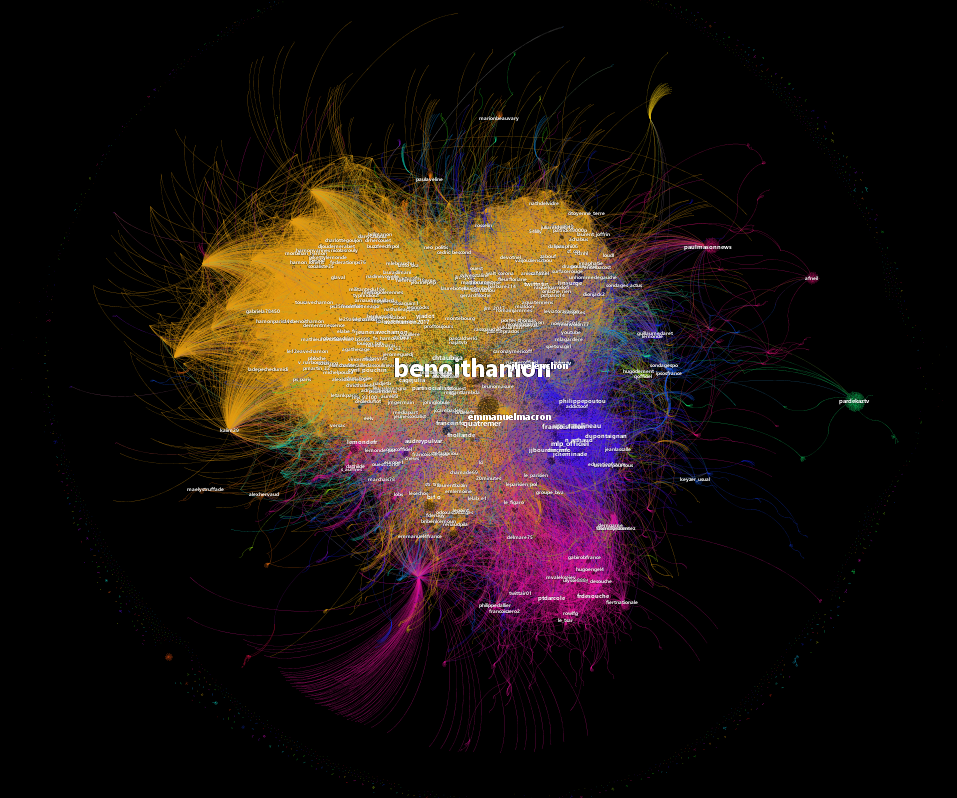 c) What Twitter has to say
c) What Twitter has to say Most people are talking about his universal income and his negotiations with Mélenchon. In the top tweets, the majority were benevolent:
Most people are talking about his universal income and his negotiations with Mélenchon. In the top tweets, the majority were benevolent: